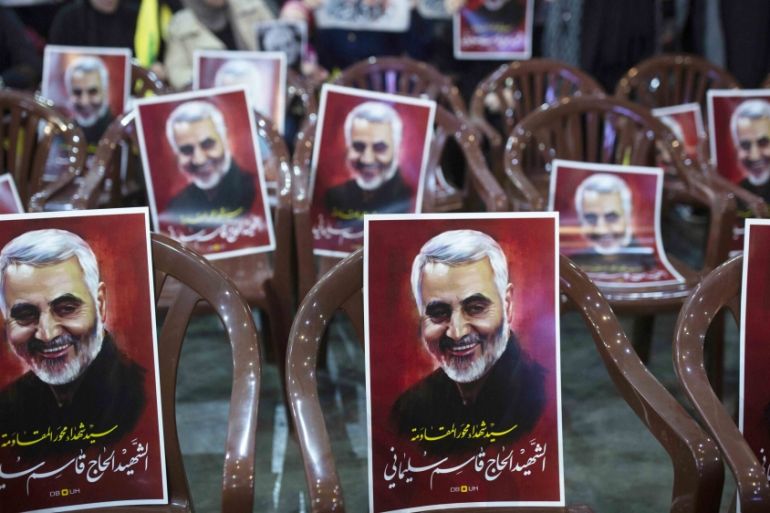US killing of Iran’s Qassem Soleimani ‘unlawful’: UN expert
President Trump ordered the drone strike near Baghdad international airport in January claiming self-defence.

The US drone strike that killed Iran’s top general Qassem Soleimani was “unlawful”, the United Nations expert on extrajudicial killings concluded in a report on Tuesday.
US President Donald Trump ordered the killing in a January 3 attack near Baghdad international airport.
Keep reading
list of 4 itemsExplosions kill dozens gathered for anniversary of Soleimani assassination
Iran blasts updates: Deadly explosions target Soleimani death anniversary
Deadly explosions in Iran during Soleimani anniversary procession
Soleimani was “the world’s top terrorist” and “should have been terminated long ago”, Trump said at the time. Iraqi commander Abu Mahdi al-Muhandis was also killed.
Callamard concluded it was an “arbitrary killing” that violated the UN charter.
“In light of the evidence that the US has provided to date, the targeting of General Soleimani, and the deaths of those accompanying him, constitute an arbitrary killing for which, under IHRL [international human rights law] the US is responsible,” said Agnes Callamard, the UN special rapporteur on extrajudicial, summary or arbitrary executions, in her report published on Tuesday.
‘Self-defence’?
She said the United States had provided no evidence “an imminent attack” against American interests was being planned.
Washington had accused Soleimani of masterminding attacks by Iranian-aligned militias on US forces in the region.
The January 3 drone strike was the first known incident in which a nation invoked self-defence as a justification for an attack against a state actor in the territory of a third country, she said.
“Major General Soleimani was in charge of Iran military strategy and actions in Syria and Iraq. But absent an actual imminent threat to life, the course of action taken by the US was unlawful,” Callamard wrote.
An Iranian prosecutor last week issued an arrest warrant for Trump and asked Interpol to help execute it over Soleimani’s killing. US-Iran envoy Brian Hook described the move as a “propaganda stunt”.
Benjamin Friedman, from George Washington University’s Elliott School of International Affairs, said the killing could be construed as an act of war.
“This attack is different from all the drone strikes because it targeted a senior figure in Iran’s government,” he told Al Jazeera. “It seemed like an act of war and an assassination.”
‘No evidence’
Callamard’s report on targeted killings through armed drones – around half of which deals with the Soleimani case – is to be presented to the UN Human Rights Council session in Geneva on Thursday.
The United States withdrew from the council in 2018.
“No evidence has been provided that General Soleimani specifically was planning an imminent attack against US interests, particularly in Iraq, for which immediate action was necessary and would have been justified,” Callamard said.
|
|
The killing of Soleimani, who headed the Quds Force, the foreign operations arm of Iran’s Revolutionary Guard, provoked enormous outpourings of grief in Iran.
Tehran retaliated by firing a volley of ballistic missiles at US troops stationed in Iraq. While the attack on the western Iraqi base of Ain al-Assad killed no US soldiers, dozens suffered brain trauma.
Callamard’s report addresses targeted killings through armed drones, in light of the proliferation in drone use and their expanding capability during the last five years.
It makes recommendations designed to regulate their use and enhance accountability.